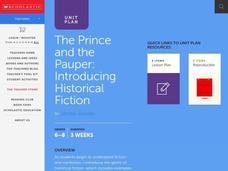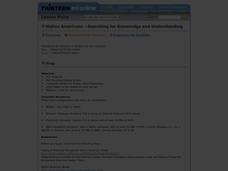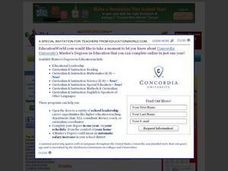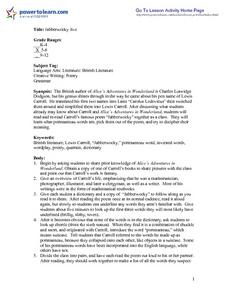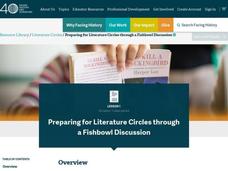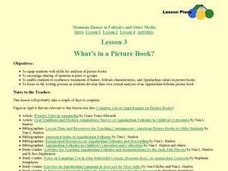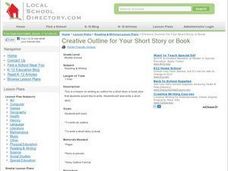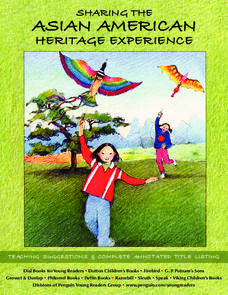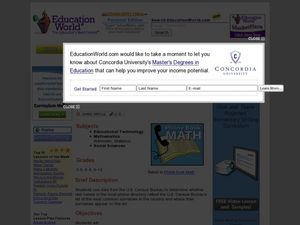Curated OER
Comic Book Project
Students write a fictional story into a comic book format. For this creative writing lesson, students analyze example comics and discuss the format. Students create a comic book using imaginary characters that find a solution to a problem.
Curated OER
Exploring Descriptive Language With Different Parts of Speech
Students practice experiencing writing with appropriate language and incorporating the eight parts of speech. They assess that many words have multiple functions when used in different contexts. Each student free writes in response to a...
Curated OER
The Prince and the Pauper
Mark Twain, the famous American author, is often studied in the school system. Use "The Prince and the Pauper" to analyze the differences between the text and its video version. This lesson plan includes several culminating project...
Curated OER
Native Americans - Searching for Knowledge and Understanding
What do you know about American Indians? Upper graders compose an informational essay based on the research they conduct. They choose a Native American group to study and, using the provided list of web links, gather information and...
Curated OER
Proverbs of One World
Bring your class to the computer lab, and have them use the library and online resources to select proverbs related to specified themes. They create a book or bulletin board of proverbs that offer lessons connected to themes of freedom,...
Curated OER
Shizuko’s Daughter: Graphic Organizer
Help young readers align character relationships in an activity for Kyoko Mori's Shizuko's Daughter. After kids discuss the characters and how they relate to each other, they use index cards and a graphic organizer to outline the...
Curated OER
"Jabberwocky" Jive
Pupils review the fantasy of Alice in Wonderland and discuss the author. After reading the poem, "Jabberwocky," they look up unfamiliar words in the dictionary. Working as partners, they create a list of "protmanteau" or invented words...
Curated OER
Let's Get Critical!
Students write a letter to a classmate recommending a favorite book and brainstorm ways in which a person would encourage others to read a book, focusing on specific elements of novels.
Curated OER
Creating Found Poetry From Picture Books
Students use picture books to identify poetic elements and word choice. They create a "found poem".
Curated OER
Design a Book Cover
Learners use the programs Pics4Learning and ImageBlender 3 to apply their knowledge of characters, plot, setting, symbolism, and conflict to design and create a book cover. Designed as a culminating literature activity.
Facing History and Ourselves
Literature Circles: Preparing for Literature Circles through a Fishbowl Discussion
Students examine the attributes of productive conversations. In this fishbowl discussion lesson plan, students observe a modeled discussion of a literature circle. Students watch a discussion of "The Bear That Wasn't" and note how...
Curated OER
What's in a Picture Book?
Pupils analyze Appalachian folktale picture books. They read and analyze various Appalachian picture books, answer discussion questions, and in small groups complete a handout, and write an essay analyzing the text and illustrations of...
Curated OER
Famous African Americans ABC Book
Students create an ABC book with short biographies of famous African Americans in history. They utilize teacher-selected and/or student-researched library sources about African Americans in history.
Curated OER
Book Chats
In this book chat worksheet, students read a book and participate in a book chat for the novel. Students use the example questions to discuss the book. Students take turns asking each other questions as they participate in the speaker...
Curated OER
Total English Upper Intermediate: Talking About Books and Stuff
In this upper intermediate writing sentences learning exercise, students compete 6 sentence starters, describe books, and take notes about books.
Curated OER
Spelling List -- Years 9 & 10
Students practice their spelling words from a book of spelling words for their age group. They must practice their spelling as to not spell without a spellcheck.
Curated OER
Creative Outline for Your Short Story or Book
Students discuss the information listed about how to make an outline for a short story or book. They then begin writing their short story and edit it and revise before turning it in to be graded.
Curated OER
Art as Storyteller
Students examine how paintings tell stories. They read biographies about artists, analyze paintings, research and write the art history of a painting, write a creative story based on the painting, and create a painting in the artist's...
Curated OER
The Young Basketball Player
Learners explore the history of basketball by reading and listening to a book entitled, "The Young Basketball Player." Afterwards, they create a trivia basketball game and write an interview for their favorite player. As a...
Curated OER
Following Their Footsteps
Students research and create a book report on a famous person. For this character education lesson, students examine the positive traits exemplified by a famous person and present an oral presentation for their classmates.
Curated OER
Asian America: Heritage Experience
Learners of all ages read and discuss books about Asian America. In this Asian-America lesson plan, different books for every age group are listed and various teaching strategies are suggested. Great tips cover virtually every grade level!
Curated OER
Surname Survey
Pupils use data from the U.S. Census Bureau to determine whether last names in a local phone directory reflect the Census Bureau's list of the most common surnames in the country. In this surnames lesson plan, students use the Internet...
Curated OER
Using Citations in a Research Paper
As a prequel to a research assignment, class members explore writing citations in the modern Language Association (MLA) and American Psychological Association (APA) formats. In pairs, or individually, researchers use books and magazines...
Curated OER
Lewis and Clark: Equipping the Expedition
Students examine the preparations made by Lewis and Clark before leaving on their expedition. They make predictions about what they believe the two explorers took and organize the list into a venn diagram. They compare their predictions...




